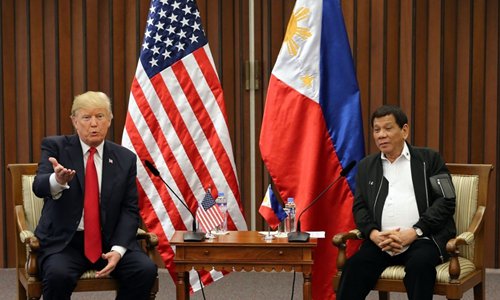HOME >> OPINION
Why US-Philippines ties are on upswing
By Ge Hongliang Source:Global Times Published: 2019/7/22 18:33:40

Photo: Xinhua
The 8th US-Philippines Bilateral Strategic Dialogue, which was held in Manila, Philippines last week, has attracted widespread attention and triggered a heated debate, because both sides recognized the importance of a strong US-Philippines alliance in enhancing security cooperation and planned relevant measures.
Since the 1950s, the Philippines has been the closest ally of the US in Southeast Asia. Alliance between the two has always played a significant role in US regional strategy.
However, since Philippine President Rodrigo Duterte took office in 2016, remarks over a rift in the alliance with the US have surfaced. But it was evident from the dialogue that the alliance still exists with signs of further consolidation.
The dialogue is the first one held in Manila since the Duterte administration assumed office. The two countries recalled US Secretary of State Mike Pompeo's statements on the 1951 Mutual Defense Treaty (MDT) during his March 2019 visit to Manila and pledged to enhance "already robust defense cooperation," according to their joint statement, which also noted "any armed attack on Philippine armed forces, public vessels, or aircraft in the South China Sea will trigger Article IV of the Mutual Defense Treaty."
Why have the US and the Philippines decided to consolidate their alliance now? Because it is in line with their current interests.
For the US, consolidating relations with the Philippines will not only prove that their bilateral ties are still robust, but also eliminate concerns that the Duterte administration is pro-China. This will serve the needs of US current regional strategy.
Over the past two years, rapid improvement of China-Philippines relations, including the temporary shelving of the South China Sea arbitration and the promotion of regional dialogue on the issue, is in sharp contrast to Duterte's anti-US rhetoric and plans to suspend joint military exercises and patrols with the US.
In the Indo-Pacific Strategy Report released in June, the US placed its "unique network of Allies and partners" at the heart of US strategy, stressing Washington would increase resources and strategic investments for the strategy. As the core region of Indo-Pacific strategy, Southeast Asia is the focus of investment.
Meanwhile, the South China Sea is the hotspot of regional security, and is significant enough for the US to promote the strategy. Based on this, the US-Philippines alliance is an essential tool of Washington's regional strategy.
For the Philippines, consolidating the alliance with the US would be in line with the interests of a few groups as well as the Duterte administration's flexible balancing strategy.
Pro-US forces in the Philippines are strong. They share the views on strengthening the alliance with Washington and tend to hype up the discord between Beijing and Manila over the South China Sea issue. Defense Secretary of the Philippines Delfin Lorenzana, who has reiterated the need to review the mutual defense treaty with the US in June, once said "I do not believe that ambiguity or vagueness of the Philippine-US Mutual Defense Treaty will serve as a deterrent."
Lorenzana believes the current treaty "will cause confusion and chaos during a crisis," and the fast-evolving security environment is "so vastly different and much more complex than the bipolar security construct of the era when the MDT was written." Obviously, the "security environment" refers to China's increasing influence of its maritime strategy and the competition between China and the US in the South China Sea.
Although China-Philippines ties are warming up, this shouldn't indicate the Duterte administration is not concerned with China's expanding influence. The reason why the alliance can be consolidated could be the result of strategy adjustments within the Philippine government.
Although the consolidation of US-Philippines alliance has not resulted in an immediate upheaval in China-Philippines relations, it could trigger negative factors in the South China Sea issue and provide possibilities for the US to implement the Indo-Pacific Strategy and boost military presence in the region.
The author is a research fellow with the College of ASEAN Studies at Guangxi University for Nationalities. opinion@globaltimes.com.cn
Posted in: ASIAN REVIEW